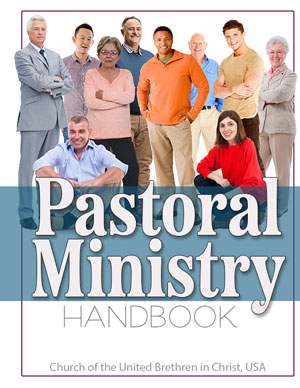PASTORAL MINISTRY HANDBOOK | CHAPTER 3
Categories and Pathways of Ministry
¶31 Credentialing Process
Credentialing ministers in the Church of the United Brethren in Christ, USA, is a process which involves the following:
1. Affirming an individual’s call to ministry.
2. Building relationships between ministers and the denomination.
3. Preparing ministers for faithful service through education and experience.
4. Assuring that ministers are both characterized by the UB Core Values and committed to the UB enduring commitments of Gospel, Unity and Mission.
¶32 Categories of Ministry
The first step in the credentialing process is to identify the type of ministry to which a minister is called by God. The Church of the United Brethren in Christ, USA recognizes three categories of ministry.
1. Ordained Elders
a. Ordained Elders are those members of the Church of the United Brethren in Christ, USA, who have been called by God to serve as professional members of the clergy.
b. Their call has been confirmed by the church through a process of examination, education, and accountability.
c. Ordained Elders are eligible to be assigned as pastors of full member congregations. They may also serve the US National Conference as cluster leaders, on leadership teams, and as denominational officials.
2. Specialized Ministers
a. Specialized Ministers are those members of the Church of the United Brethren in Christ, USA, who have been called by God to serve as non-ordained, pastoral staff members of churches in the denomination.
b. Specialized Ministers either oversee specific areas of ministry or are planting new congregations.
c. This designation does not include ministry support positions, such as secretarial or custodial staff, nor anyone serving as the pastor of a full member congregation.
3. Lay Ministers
a. Lay Ministers are those members of the Church of the United Brethren in Christ, USA, who feel called to use the gifts God has given them to perform specific acts of ministry and leadership in the local church, but who do not at the present time feel a special call to become an ordained elder.
b. Typically, Lay Ministers serve under the guidance and direction of the senior pastor.
c. Under special circumstances, lay ministers may be assigned as pastors of full member congregations at the discretion of the bishop.
¶33 Pathways for Credentialing Ministers
Recognizing that different categories of ministry involve varied processes, the Church of the United Brethren in Christ, USA has approved the following pathways for credentialing ministers.
(Note: Chapter 22 contains a chart which lays out the credentialling pathways, along with the requirements for each step.)
1. Ordained Elders
a. Definition. This is the ordinary pathway for ministers who desire to serve as pastors of full member congregations.
b. Process. The credentialing pathway for Ordained Elders is a three-step process. This pathway begins with the Provisional License, continues with the National Conference License, and culminates with being ordained as an Elder in the Church of the United Brethren in Christ, USA.
c. Requirements. Advancing through this process requires:
(1) Progress in the Course of Study for Ordination
(2) Fulfilling the expectations of ministers for a minimum of three years.
2. Specialized Ministers
a. Definition. This is the ordinary pathway for ministers who desire to serve as non-ordained staff members in full member congregations or who are planting new congregations.
b. Process. The credentialing pathway for Specialized Ministers is a two-step process. This pathway begins with the Provisional License and culminates with the Specialized Ministry License.
c. Requirements. Advancing through this process requires:
(1) Completing the Specialized Course of Study.
(2) Fulfilling the expectations of ministers for a minimum of one year.
3. Lay Ministers
a. Definition. This is the ordinary pathway for lay people who desire to perform specific acts of ministry and leadership in the local church under the guidance and direction of the Senior Pastor.
b. Process. The credentialing pathway for Lay Ministers is a two-step process. This pathway begins with the Temporary License and culminates with the Permanent License.
c. Requirements. Advancement through this process requires:
(1) Completing the Lay Minister Course of Study.
(2) Fulfilling the expectations of ministers for a minimum of two years.
¶34 Classifications
1. Ministers in the Church of the United Brethren in Christ, USA, can be classified as follows:
a. Lay ministers.
b. Provisional ministers.
c. Specialized ministers.
d. National conference ministers.
e. Ordained elders.
2. Specific descriptions for each of these classifications are described in the Pastoral Ministry Handbook maintained and revised by the Pastoral Ministry Leadership Team.
3. Any ministers in these classifications who are actively stationed or hired by a local church, and who meet current Internal Revenue Service requirements for exemption, are considered by the Church of the United Brethren in Christ, USA, as eligible for such exemption.




